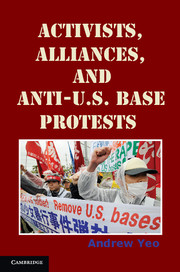Book contents
- Frontmatter
- Contents
- List of Figures
- List of Tables
- Preface and Acknowledgments
- List of Abbreviations
- Introduction
- 1 Anti-Base Movements and the Security Consensus Framework
- 2 Under a Weak Security Consensus
- 3 The U.S.-Japan Alliance and Anti-Base Movements in Okinawa, 1995–1996
- 4 Anti-Base Movements in Ecuador and Italy
- 5 South Korean Anti-Base Movements and the Resilience of the Security Consensus
- 6 Alliance Relations and the Security Consensus Across Time
- 7 Activists, Alliances, and the Future of U.S. Basing Strategy
- Appendix: Selected List of Interviews
- Bibliography
- Index
- References
5 - South Korean Anti-Base Movements and the Resilience of the Security Consensus
Published online by Cambridge University Press: 05 June 2012
- Frontmatter
- Contents
- List of Figures
- List of Tables
- Preface and Acknowledgments
- List of Abbreviations
- Introduction
- 1 Anti-Base Movements and the Security Consensus Framework
- 2 Under a Weak Security Consensus
- 3 The U.S.-Japan Alliance and Anti-Base Movements in Okinawa, 1995–1996
- 4 Anti-Base Movements in Ecuador and Italy
- 5 South Korean Anti-Base Movements and the Resilience of the Security Consensus
- 6 Alliance Relations and the Security Consensus Across Time
- 7 Activists, Alliances, and the Future of U.S. Basing Strategy
- Appendix: Selected List of Interviews
- Bibliography
- Index
- References
Summary
It's a crucial and legitimate government project that has much at stake, namely U.S.-Korea relations.
– ROK Defense Minister Yoon Kwang-ungOn May 4, 2005, 12,000 riot police entered Daechuri village, a small village in Pyeongtaek, South Korea, 50 miles south of Seoul in Kyongi Province. Activists and local residents, refusing to leave their farmland, were making a desperate stand to block the expansion and relocation of United States Forces, Korea (USFK) headquarters to Camp Humphreys. While South Korean soldiers erected barbed wire around the base expansion land outside Camp Humphreys, 2,000 activists battled riot police who stormed Daechuri Elementary School, the makeshift headquarters of the Pan–South Korean Solution Committee Against Base Expansion in Pyeongtaek (KCPT). One hundred and twenty protestors, police, and soldiers were injured, and 524 protestors, mostly students and activists, were taken into custody. Immediately following the violence, the Ministry of National Defense (MND) went on a public relations offensive, highlighting the violent tactics of protestors attacking an unarmed engineering brigade. The government's public relations campaign severely damaged the credibility of South Korean anti-base activists in their struggle to block the expansion of Camp Humphreys. The KCPT never fully recovered from the May 4 clash, and eventually faded away by the end of 2007.
- Type
- Chapter
- Information
- Activists, Alliances, and Anti-U.S. Base Protests , pp. 118 - 148Publisher: Cambridge University PressPrint publication year: 2011



